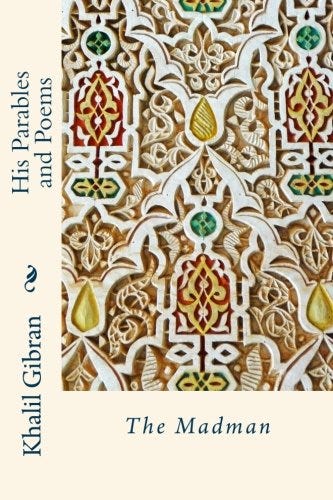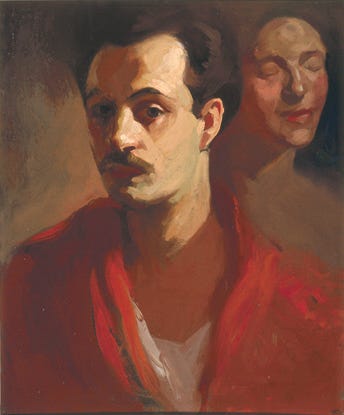Why I ❤️ Kahlil Gibran's "The Madman"
The Books We ❤️ Club welcomes Terry Freedman of Eclecticism: Reflections on literature, writing and life
When I was a kid, our family had a copy of Kahlil Gibran’s The Prophet hanging around that nobody read. It was that classic yellow-covered edition with the pencil sketch, and since we lived in Saudi Arabia at the time, I just assumed our Muslim hosts put a copy of it in every household, like Gideon Bibles in hotel rooms.
Of course this was the wildly simplistic view of a seven-year-old, but in truth I have no idea how we came to have it. Certainly it was never something my mother would have focused her gaze on longer than required to dust it; she might have touched it a thousand times, but if you asked her about The Prophet by Kahlil Gibran, she would have said, “Don’t get smart with me, young man.”
I can see one of my father’s work or golf buddies giving it to him in a moment of misplaced hope that they might bond over something more elevated than what flavor of sadiqi he wanted with his Pepsi, white or brown?
(Sadiqi is Arabic for my friend, the word they used for the local hooch that could be left in its natural eye-wateringly clear state if you liked vodka, or stained with wood chips a passing caramel color if you liked whiskey.)
I say misplaced because my father would have passed such a gift to my mother without looking at it, and told the son-of-a-bitch who gave it to him that Pepsi was for slobs and to give him his paint thinner neat.
We hope you enjoy Terry’s discussion of The Madman—in a world full of Kool-Aid peddlers, we need all the help we can get.
Cheers ~ MTF
The Books We ❤️ Club—the book club you don’t actually have to read the book, leave the house, or even change out of your jammies to enjoy—as writers sing the praises of books that reach into our hearts.
We invite you to add your own reactions, insights, and ideas in the Comments for an impromptu book club session. Share your favorite quotes, characters, moments, and surprises in discussion with other passionate readers.
(And if you’d like to feature your favorite book in a future edition, DM me.)
NEXT TIME: “Why I *Don’t* Love James Joyce’s Ulysses” with of
Why I ❤️ Kahlil Gibran's The Madman
by
ofKahlil Gibran was a Lebanese writer and poet who probably is best known for his book The Prophet. That book could perhaps be considered a description of an ideal way of being, while The Madman, published some five years earlier in 1918, might be described as an extended version of the story of the “The Emperor’s New Clothes.” Being something of a cynic, I find that appealing.
The book opens with an explanation of how Gibran became a madman. He says his masks have been stolen, and he runs through the streets shouting “Thieves, thieves, the cursèd thieves.” He continues:
And when I reached the market place, a youth standing on a house-top cried, “He is a madman.” I looked up to behold him; the sun kissed my own naked face for the first time. For the first time the sun kissed my own naked face and my soul was inflamed with love for the sun, and I wanted my masks no more. And as if in a trance I cried, “Blessed, blessed are the thieves who stole my masks.”
Thus I became a madman.
And I have found both freedom of loneliness and the safety from being understood, for those who understand us enslave something in us.
As you can see, the prose is quite poetic. Indeed, I think of each short item as a prose poem. And although some of the stories are rather archaic in style, with plenty of “thee’s” and “thou’s”, the messages are surprisingly modern.
For example, in a story entitled “On Giving And Taking” the mother of Jesus goes to a man who has thousands of needles. She tells him that her son’s garment is torn, and asks if he will give her a needle so that she can sew it up. The story ends:
And he gave her not a needle, but he gave her a learned discourse on Giving and Taking.
I’ve met people like that!
One of the problems societies face is what we would nowadays call “groupthink.” It can be quite frightening how sometimes a completely insane idea by any objective criteria is entertained by a group or sometimes even a whole society. Anyone daring to “challenge the narrative” is dismissed as either nefarious or intellectually challenged. Gibran has something to say about this phenomenon too.
In one of my favourite stories, someone poisons the water supply in a kingdom, and everyone wakes up insane the following day. They are all worried about the king because he, not having drunk the water yet, is quite sane. He decides to drink the adulterated water and becomes mad himself. His subjects breathe a collective sigh of relief because, from their perspective, their ruler has regained his sanity.
A challenge we each face I think is how we embrace, or try to reject, inner change. Discovering that we no longer wish to be in the company of a friend, or employed in the same job, can be extremely uncomfortable. It’s as though you’ve become unmoored in some way. Gibran addresses this too, in a story called “The Grave-Digger.” Here it is in full:
Once, as I was burying one of my dead selves, the grave-digger came by and said to me, “Of all those who come here to bury, you alone I like.”
Said I, “You please me exceedingly, but why do you like me?”
“Because,” said he, “They come weeping and go weeping—you only come laughing and go laughing.”
I should like to propose a theory I’ve long held about Gibran, though I have no way of testing it. He often alludes to a deep inner silence that does nothing except watch. A good example of this is in this story called “The Seven Selves.” In this story, while Gibran is sleeping his seven selves have a discussion. Each of them complains about the role he has been allotted.
For example:
Third Self: And what of me, the love-ridden self, the flaming brand of wild passion and fantastic desires? It is I the love-sick self who would rebel against this madman.
When it comes to the seventh self, we read the following:
Seventh self: How strange that you all would rebel against this man, because each and every one of you has a preordained fate to fulfil. Ah! could I but be like one of you, a self with a determined lot! But I have none, I am the do-nothing self, the one who sits in the dumb, empty nowhere and nowhen, while you are busy re-creating life. Is it you or I, neighbours, who should rebel?
The story continues:
When the seventh self thus spake the other six selves looked with pity upon him but said nothing more; and as the night grew deeper one after the other went to sleep enfolded with a new and happy submission.
But the seventh self remained watching and gazing at nothingness, which is behind all things.
So here is my theory. I’ve been practising Transcendental Meditation for a long time, which I wrote about in an article called No, I don’t wear saffron robes! Maharishi Mahesh Yogi, who introduced the practice to the West, talks about seven states of consciousness. The first three are as follows:
Waking.
Sleeping.
Dreaming.
The fourth state is what he calls Transcendental Consciousness, which is a deep level of silence reached (on a good day!) while you’re meditating. It’s a state in which you don’t think anything, because you’ve gone beyond thought. Let’s put it this way: if you suddenly think, “How marvellous, I’m transcending!”, then you’re not!
The fifth state of consciousness is where that state of Transcendental Consciousness is present all the time, whether you’re awake, asleep or dreaming. I’m pretty sure both from some of the stories in The Madman and his other writings, that Gibran enjoyed that state.
On another personal note, my copy of The Madman was given to me by a friend, with the inscription “Terry: happy days from Richard (name changed) from America.” I invited him to stay with me for a weekend in Liverpool, where I was studying at the university. He repaid my hospitality by making advances to my girlfriend. You might think that such an association would mar my enjoyment of the book. However, such is its power and beauty, that has not proved to be the case.
Although I should highly recommend buying the book, you don’t have to: Project Gutenberg Australia has published a free online version, the source of the excerpts in this article: The Madman. I hope I have inspired you to explore this work. It is highly allegorical, and I think we all need allegories to help us navigate the world!













Great talk, Terry - thanks for pointing the way on this "lost" classic! I especially loved "On Giving and Taking" and "The Grave-Digger." Glad "Richard" didn't spoil your enjoyment. ;)
Fascinating! I've never really taken to Gibran, but I loved the story about the king drinking the adulterated water... somehow it reminds me of an early Bowie song (perhaps he was influenced by Gibran's story?):
"'Cause I'd rather stay here
With all the madmen
Than perish with the sadmen roaming free
And I'd rather play here
With all the madmen
For I'm quite content they're all as sane
As me."
"All the madmen" (1970)